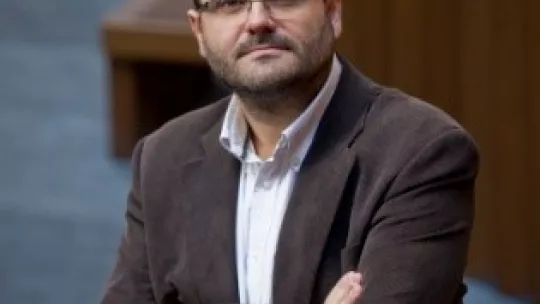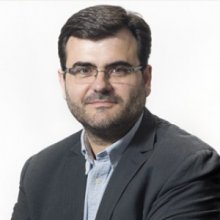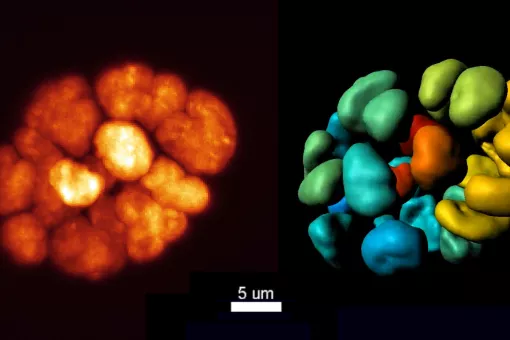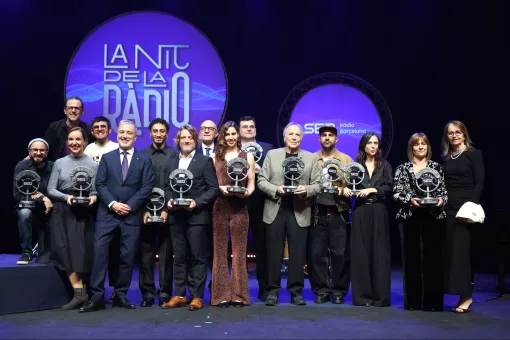Images
The foundation, which is based in Madrid, awards Batlle for his research of excellence on colon cancer—one of the tumours with greatest prevalence worldwide.The foundation, which is based in Madrid, awards Batlle for his research of excellence on colon cancer—one of the tumours with greatest prevalence worldwide.
The jury of the XI Francisco Cobos Foundation Prize for excellence in biomedical research has named the scientist Eduard Batlle, at the Institute for Research in Biomedicine (IRB Barcelona) winner of the 2017 award, in recognition of his contribution to knowledge of colorectal cancer and the potential of his research to generate new treatments and diagnostic tools for this disease.
Presented to Spanish scientists considered to have made relevant contributions to biomedical research in the last five years, the prize seeks to strengthen their research and scientific projects. The patron Francisco Cobos (1924–2015), who set up the foundation in 1999, believed that “we live in a world in which science underlies everything. Within science, people most directly perceive biomedical breakthroughs, because at the end of the day health and disease affect us all. The general public is great debt to researchers”.
In pursuit of the keys to colon cancer
The ICREA researcher Eduard Batlle has served as coordinator of the Oncology Programme and head of the Colorectal Cancer Laboratory at IRB Barcelona since 2005. He is also a member of the CIBERONC network (Biomedical Research Networking Centre in Oncology) since 2017, from which the lab receives funds for developing the studies. His laboratory studies how colon cancer begins and its development into aggressive tumours with the capacity to metastasize. His most important findings include the identification of colorectal stem cells and the crucial role of the tumour milieu for metastasis—the process by which tumour cells spread to other organs. These discoveries have the potential to lead to new diagnostic and therapeutic tools.
Eduard Batlle has received funding from the European Research Council (ERC) since 2008, first through an ERC Starting Grant, then through an ERC Advanced Grant, awarded in 2013, and finally through an ERC Proof of Concept, given in 2014, the latter devoted to the clinical translation of his results.
The achievements made by Eduard Battle’s lab in recent years has placed it among the most advanced in its field, allowing it to become an international reference for the scientific community.
Presentation in October
The presentation of the XI Prize will take place in October during an academic event that will bring together authorities from the scientific community.
Twenty-five candidacies of exceptional international standing were presented for this award. The jury was chaired by Emilio Lora Tamayo D’Ocon, president of the Consejo Superior de Investigaciones Científicas (CSIC).
The Francisco Cobos Foundation Prize was relaunched en 2016 after several years in which it was not presented. The awardee last year was Manuel Serrano, who is now a group leader at IRB Barcelona.
About IRB Barcelona
Created in 2005 by the Generalitat de Catalunya (Government of Catalonia) and University of Barcelona, IRB Barcelona is a Severo Ochoa Centre of Excellence, a seal that was awarded in 2011. The institute is devoted to conducting research of excellence in biomedicine and to transferring results to clinical practice, thus improving people’s quality of life, while simultaneously promoting the training of outstanding researchers, technology transfer, and public communication of science. Its 25 laboratories and seven core facilities address basic questions in biology and are orientated to diseases such as cancer, metastasis, Alzheimer’s, diabetes, and rare conditions. IRB Barcelona is an international centre that hosts 400 employees and 32 nationalities. It is located in the Barcelona Science Park. IRB Barcelona forms part of the Barcelona Institute of Science and Technology (BIST) and the “Xarxa de Centres de Recerca de Catalunya” (CERCA).
About IRB Barcelona
The Institute for Research in Biomedicine (IRB Barcelona) pursues a society free of disease. To this end, it conducts multidisciplinary research of excellence to cure cancer and other diseases linked to ageing. It establishes technology transfer agreements with the pharmaceutical industry and major hospitals to bring research results closer to society, and organises a range of science outreach activities to engage the public in an open dialogue. IRB Barcelona is an international centre that hosts 400 researchers and more than 30 nationalities. Recognised as a Severo Ochoa Centre of Excellence since 2011, IRB Barcelona is a CERCA centre and member of the Barcelona Institute of Science and Technology (BIST).






